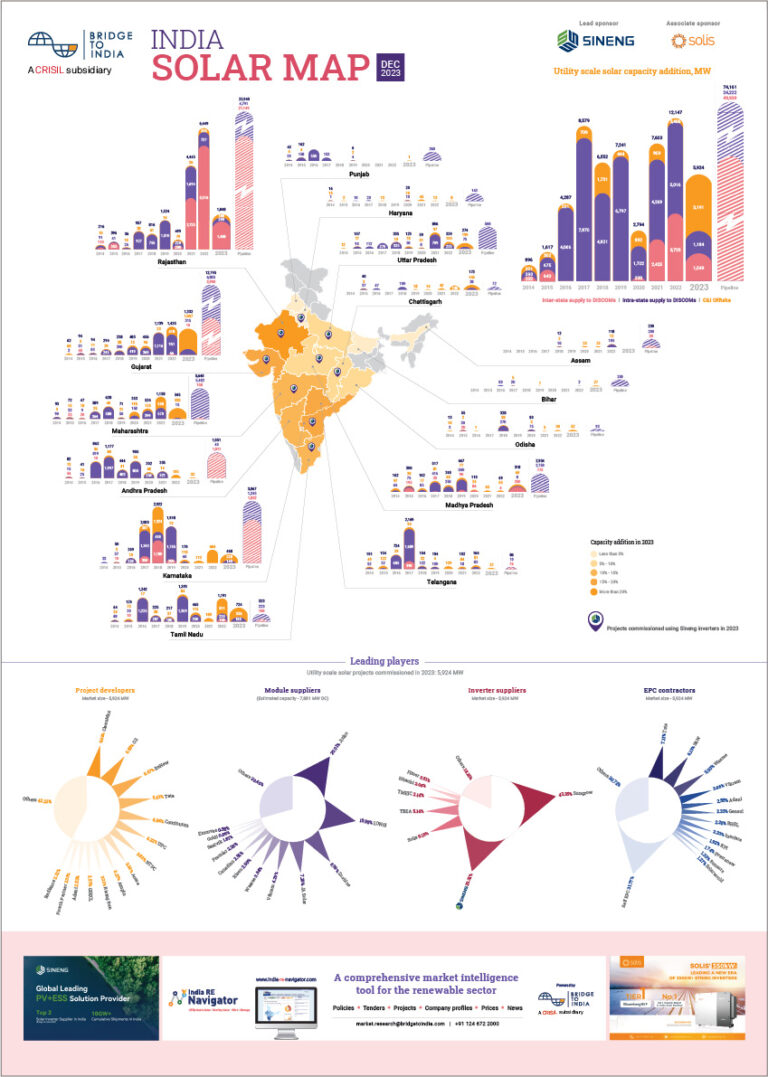- The Karnataka Electricity Regulatory Commission (KERC) has announced benchmark tariffs for grid connected solar projects.
- These benchmarks mean very little because they are what they are – benchmarks
- For rooftop and small plants, a net metering policy will determine actual tariffs for excess energy fed back into the grid.
| Type of Solar Plant |
Tariff |
| Solar PV plants |
8.40 |
| Rooftop and small solar plants |
9.56 |
| Rooftop and small solar plants with 30% capital subsidy |
7.20 |
Let’s start with the third category – rooftop and small solar plants with capital subsidy. As BRIDGE TO INDIA noted in this earlier blog post, the Ministry of New and Renewable Energy (MNRE) has stopped disbursements of subsidy – with no clear deadline for reinstating this scheme. So there are likely to be no projects that would come under this category.
In case of the large scale solar PV plants, a reverse bidding process under the Karnataka Solar Policy determines the PPA price. The Karnataka Solar Policy was announced in 2011 and has a target of 350 MW by 2016. The state auctioned 80 MW in 2011 and a further 130 MW in 2013 (Refer the India Solar Handbook, June 2013, BRIDGE TO INDIA). The lowest successful bid during the first phase of the auction was at INR 7.94/kWh and the highest at INR 8.50/kWh. The next round of 130 MW saw bids between INR 5.51/kWh and INR 8.05/kWh. The average successful bid coming to INR 7.06/kWh (see previous blog). The result of both bids show that KERC’s benchmark tariff and actual market prices are highly divergent. The tariff by itself only serves as a benchmark for the reverse bidding process.
In case of small and rooftop solar plants, there is generally no reverse bidding. Although Karnataka has not announced a specific net metering or rooftop policy until date, similar policies announced in other states show that projects under this category are allocated on a first-come-first-serve basis. It is highly unlikely that Karnataka’s distribution companies (BESCOM, HESCOM, MESCOM, GESCOM, CESCOM) will pay rooftop system owners INR 9.56/kWh for feeding in the excess generation back onto the grid. The DISCOMs in Karnataka currently procure power at a price of INR 2.78/kWh.
Sources say that Karnataka is in the process of finalizing a net-metering policy. It is highly likely that the policy goes along the lines of Andhra Pradesh’s net metering policy, where the DISCOM does not pay for any excess generation. Andhra Pradesh’s net metering policy only adjusts solar generation against the user’s current consumption (like a banking agreement).
The KERC order must be taken with a pinch of salt and for what it is – a suggestive benchmark. History has shown that benchmarks and actual market realities are often very divergent. Ultimately Karnataka’s net metering policy shall determine the tariffs for rooftop and small solar systems.
Akhilesh Magal heads the Project Development team at BRIDGE TO INDIA. He likes to blog about the progress of rooftop PV in India.












